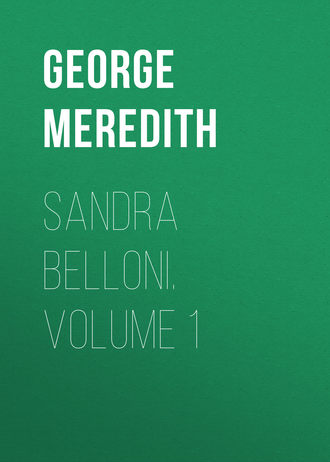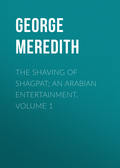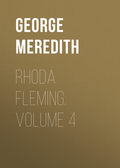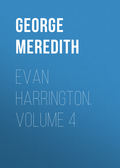
George Meredith
Sandra Belloni. Volume 1
CHAPTER VIII
The windows of Brookfield were thrown open to the air of May, and bees wandered into the rooms, gold spots of sunshine danced along the floors. The garden-walks were dazzling, and the ladies went from flower-bed to flower-bed in broad garden hats that were, as an occasional light glance flung at a window-pane assured Adela, becoming. Sunshine had burst on them suddenly, and there was no hat to be found for Emilia, so Wilfrid placed his gold-laced foraging-cap on her head, and the ladies, after a moment's misgiving, allowed her to wear it, and turned to observe her now and then. There was never pertness in Emilia's look, which on the contrary was singularly large and calm when it reposed: perhaps her dramatic instinct prompted her half-jaunty manner of leaning against the sunny corner of the house where the Chinese honeysuckle climbed. She was talking to Wilfrid. Her laughter seemed careless and easy, and in keeping with the Southern litheness of her attitude.
"To suit the cap; it's all to suit the cap," said Adela, the keen of eye. Yet, critical as was this lady, she acknowledged that it was no mere acting effort to suit the cap.
The philosopher (I would keep him back if I could) bids us mark that the crown and flower of the nervous system, the head, is necessarily sensitive, and to that degree that whatsoever we place on it, does, for a certain period, change and shape us. Of course the instant we call up the forces of the brain, much of the impression departs but what remains is powerful, and fine-nerved. Woman is especially subject to it. A girl may put on her brother's boots, and they will not affect her spirit strongly; but as soon as she puts on her brother's hat, she gives him a manly nod. The same philosopher who fathers his dulness on me, asserts that the modern vice or fastness ('Trotting on the Epicene Border,' he has it) is bred by apparently harmless practices of this description. He offers to turn the current of a Republican's brain, by resting a coronet on his forehead for just five seconds.
Howsoever these things be, it was true that Emilia's feet presently crossed, and she was soon to be seen with her right elbow doubled against her head as she leaned to the wall, and the little left fist stuck at her belt. And I maintain that she had no sense at all of acting Spanish prince disguised as page. Nor had she an idea that she was making her friend Wilfrid's heart perform to her lightest words and actions, like any trained milk-white steed in a circus. Sunlight, as well as Wilfrid's braided cap, had some magical influence on her. He assured her that she looked a charming boy, and she said, "Do I?" just lifting her chin.
A gardener was shaving the lawn.
"Please, spare those daisies," cried Emilia. "Why do you cut away daisies?"
The gardener objected that he really must make the lawn smooth. Emilia called to Adela, who came, and hearing the case, said: "Now this is nice of you. I like you to love daisies and wish to protect them. They disfigure a lawn, you know." And Adela stooped, and picked one, and called it a pet name, and dropped it.
She returned to her sisters in the conservatory, and meeting Mr. Barren at the door, made the incident a topic. "You know how greatly our Emilia rejoices us when she shows sentiment, and our thirst is to direct her to appreciate Nature in its humility as well as its grandeur."
"One expects her to have all poetical feelings," said Mr. Barrett, while they walked forth to the lawn sloping to the tufted park grass.
Cornelia said: "You have read Mr. Runningbrook's story?"
"Yes."
But the man had not brought it back, and her name was in it, written with her own hand.
"Are you of my opinion in the matter?"
"In the matter of the style? I am and I am not. Your condemnation may be correct in itself; but you say, 'He coins words'; and he certainly forces the phrase here and there, I must admit. The point to be considered is, whether friction demands a perfectly smooth surface. Undoubtedly a scientific work does, and a philosophical treatise should. When we ask for facts simply, we feel the intrusion of a style. Of fiction it is part. In the one case the classical robe, in the other any mediaeval phantasy of clothing."
"Yes; true;" said Cornelia, hesitating over her argument. "Well, I must conclude that I am not imaginative."
"On the contrary, permit me to say that you are. But your imagination is unpractised, and asks to be fed with a spoon. We English are more imaginative than most nations."
"Then, why is it not manifested?"
"We are still fighting against the Puritan element, in literature as elsewhere."
"Your old bugbear, Mr. Barrett!"
"And more than this: our language is not rich in subtleties for prose. A writer who is not servile and has insight, must coin from his own mint. In poetry we are rich enough; but in prose also we owe everything to the licence our poets have taken in the teeth of critics. Shall I give you examples? It is not necessary. Our simplest prose style is nearer to poetry with us, for this reason, that the poets have made it. Read French poetry. With the first couplet the sails are full, and you have left the shores of prose far behind. Mr. Runningbrook coins words and risks expressions because an imaginative Englishman, pen in hand, is the cadet and vagabond of the family—an exploring adventurer; whereas to a Frenchman it all comes inherited like a well filled purse. The audacity of the French mind, and the French habit of quick social intercourse, have made them nationally far richer in language. Let me add, individually as much poorer. Read their stereotyped descriptions. They all say the same things. They have one big Gallic trumpet. Wonderfully eloquent: we feel that: but the person does not speak. And now, you will be surprised to learn that, notwithstanding what I have said, I should still side with Mr. Runningbrook's fair critic, rather than with him. The reason is, that the necessity to write as he does is so great that a strong barrier—a chevaux-de-frise of pen points—must be raised against every newly minted word and hazardous coiner, or we shall be inundated. If he can leap the barrier he and his goods must be admitted. So it has been with our greatest, so it must be with the rest of them, or we shall have a Transatlantic literature. By no means desirable, I think. Yet, see: when a piece of Transatlantic slang happens to be tellingly true— something coined from an absolute experience; from a fight with the elements—we cannot resist it: it invades us. In the same way poetic rashness of the right quality enriches the language. I would make it prove its quality."
Cornelia walked on gravely. His excuse for dilating on the theme, prompted her to say: "You give me new views": while all her reflections sounded from the depths: "And yet, the man who talks thus is a hired organ-player!"
This recurring thought, more than the cogency of the new views, kept her from combating certain fallacies in them which had struck her.
"Why do you not write yourself, Mr. Barrett?"
"I have not the habit."
"The habit!"
"I have not heard the call."
"Should it not come from within?"
"And how are we to know it?"
"If it calls to you loudly!"
"Then I know it to be vanity."
"But the wish to make a name is not vanity."
"The wish to conceal a name may exist."
Cornelia took one of those little sly glances at his features which print them on the brain. The melancholy of his words threw a somber hue about him, and she began to think with mournfulness of those firm thin lips fronting misfortune: those sunken blue eyes under its shadow.
They walked up to Mr. Pole, who was standing with Wilfrid and Emilia on the lawn; giving ear to a noise in the distance.
A big drum sounded on the confines of the Brookfield estate. Soon it was seen entering the precincts at one of the principal gates, followed by trombone, and horn, and fife. In the rear trooped a regiment of Sunday- garmented villagers, with a rambling tail of loose-minded boys and girls. Blue and yellow ribands dangled from broad beaver hats, and there were rosettes of the true-blue mingled with yellow at buttonholes; and there was fun on the line of march. Jokes plumped deep into the ribs, and were answered with intelligent vivacity in the shape of hearty thwacks, delivered wherever a surface was favourable: a mode of repartee worthy of general adoption, inasmuch as it can be passed on, and so with certainty made to strike your neighbour as forcibly as yourself: of which felicity of propagation verbal wit cannot always boast. In the line of procession, the hat of a member of the corps shot sheer into the sky from the compressed energy of his brain; for he and all his comrades vociferously denied having cast it up, and no other solution was possible. This mysterious incident may tell you that beer was thus early in the morning abroad. In fact, it was the procession day of a provincial Club-feast or celebration of the nuptials of Beef and Beer; whereof later you shall behold the illustrious offspring.
All the Brookfield household were now upon the lawn, awaiting the attack. Mr. Pole would have liked to impound the impouring host, drum and all, for the audacity of the trespass, and then to have fed them liberally, as a return for the compliment. Aware that he was being treated to the honours of a great man of the neighbourhood, he determined to take it cheerfully.
"Come; no laughing!" he said, directing a glance at the maids who were ranged behind their mistresses. "'Hem! we must look pleased: we mustn't mind their music, if they mean well."
Emilia, whose face was dismally screwed up at the nerve-searching discord, said: "Why do they try to play anything but a drum?"
"In the country, in the country;" Mr. Pole emphasized. "We put up with this kind of thing in the country. Different in town; but we—a—say nothing in the country. We must encourage respect for the gentry, in the country. One of the penalties of a country life. Not much harm in it. New duties in the country."
He continued to speak to himself. In proportion as he grew aware of the unnecessary nervous agitation into which the drum was throwing him, he assumed an air of repose, and said to Wilfrid: "Read the paper to-day?" and to Arabella, "Quiet family dinner, I suppose?"
"Yes, sir," he remarked to Mr. Barrett, as if resuming an old conversation: "I dare say, you've seen better marching in foreign parts. Right—left; right—left. Ha! ha! And not so bad, not so bad, I call it! with their right—left; right—left. Ha! ha! You've seen better. No need to tell me that. But, in England, we look to the meaning of things. We're a practical people. What's more, we're volunteers. Volunteers in everything. We can't make a regiment of ploughmen march like clock-work in a minute; and we don't want to. But, give me the choice; I'll back a body of volunteers any day."
"I would rather be backed by them, sir," said Mr. Barrett.
"Very good. I mean that. Honest intelligent industry backing rank and wealth! That makes a nation strong. Look at England!"
Mr. Barrett observed him stand out largely, as if filled by the spirit of the big drum.
That instrument now gave a final flourish and bang whereat Sound, as if knocked on the head, died languishingly.
And behold, a spokesman was seen in relief upon a background of grins, that were oddly intermixed with countenances of extraordinary solemnity.
The same commenced his propitiatory remarks by assuring the proprietor of Brookfield that he, the spokesman, and every man present, knew they had taken a liberty in coming upon Squire Pole's grounds without leave or warning. They knew likewise that Squire Pole excused them.
Chorus of shouts from the divining brethren.
Right glad they were to have such a gentleman as Squire Pole among them: and if nobody gave him a welcome last year, that was not the fault of the Yellow-and-Blues. Eh, my boys?
Groans and cheers.
Right sure was spokesman that Squire Pole was the friend of the poor man, and liked nothing better than to see him enjoy his holiday. As why shouldn't he enjoy his holiday now and then, and have a bit of relaxation as well as other men?
Acquiescent token on the part of the new dignitary, Squire Pole.
Spokesman was hereby encouraged to put it boldly, whether a man was not a man all the world over.
"For a' that!" was sung out by some rare bookworm to rearward: but no
Scot being present, no frenzy followed the quotation.
It was announced that the Club had come to do homage to Squire Pole and ladies: the Junction Club of Ipley and Hillford. What did Junction mean? Junction meant Harmony. Harmonious they were, to be sure: so they joined to good purpose.
Mr. Barrett sought Emilia's eyes smilingly, but she was intent on the proceedings.
A cry of "Bundle o' sticks, Tom Breeks. Don't let slip 'bout bundle o' sticks," pulled spokesman up short. He turned hurriedly to say, "All right," and inflated his chest to do justice to the illustration of the faggots of Aesop: but Mr. Tom Breeks had either taken in too much air, or the ale that had hitherto successfully prompted him was antipathetic to the nice delicacy of an apologue; for now his arm began to work and his forehead had to be mopped, and he lashed the words "Union and Harmony" right and left, until, coming on a sentence that sounded in his ears like the close of his speech, he stared ahead, with a dim idea that he had missed a point. "Bundle o' sticks," lustily shouted, revived his apprehension; but the sole effect was to make him look on the ground and lift his hat on the point of a perplexed finger. He could not conceive how the bundle of sticks was to be brought in now; or what to say concerning them. Union and Harmony:—what more could be said? Mr. Tom Breeks tried a remonstrance with his backers. He declared to them that he had finished, and had brought in the Bundle. They replied that they had not heard it; that the Bundle was the foundation—sentiment of the Club; the first toast, after the Crown; and that he must go on until the Bundle had been brought in. Hereat, the unhappy man faced Squire Pole again. It was too abject a position for an Englishman to endure. Tom Breeks cast his hat to earth. "I'm dashed if I can bring in the bundle!"
There was no telling how conduct like this might have been received by the Yellow-and-Blues if Mr. Barrett had not spoken. "You mean everything when you say "Union," and you're quite right not to be tautological. You can't give such a blow with your fingers as you can with your fists, can you?"
Up went a score of fists. "We've the fists: we've the fists," was shouted.
Cornelia, smiling on Mr. Barrett, asked him why he had confused the poor people with the long word "tautological."
"I threw it as a bone," said he. "I think you will observe that they are already quieter. They are reflecting on what it signifies, and will by- and-by quarrel as to the spelling of it. At any rate it occupies them."
Cornelia laughed inwardly, and marked with pain that his own humour gave him no merriment.
At the subsiding of the echoes that coupled Squire Pole and the Junction Club together, Squire Pole replied. He wished them well. He was glad to see them, and sorry he had not ale enough on the premises to regale every man of them. Clubs were great institutions. One fist was stronger than a thousand fingers—"as my friend here said just now." Hereat the eyelids of Cornelia shed another queenly smile on the happy originator of the remark.
Squire Pole then descended to business. He named the amount of his donation. At this practical sign of his support, heaven heard the gratitude of the good fellows. The drum awoke from its torpor, and summoned its brethren of the band to give their various versions of the National Anthem.
"Can't they be stopped?" Emilia murmured, clenching her little hands.
The patriotic melody, delivered in sturdy democratic fashion, had to be endured. It died hard, but did come to an end, piecemeal. Tom Breeks then retired from the front, and became a unit once more. There were flourishes that indicated a termination of the proceedings, when another fellow was propelled in advance, and he, shuffling and ducking his head, to the cries of "Out wi' it, Jim!" and, "Where's your stomach?" came still further forward, and showed a most obsequious grin.
"Why, it's Jim!" exclaimed Emilia, on whom Jim's eyes were fastened.
Stepping nearer, she said, "Do you want to speak to me?"
Jim had this to say: which, divested of his petition for pardon on the strength of his perfect knowledge that he took a liberty, was, that the young lady had promised, while staying at Wilson's farm, that she would sing to the Club-fellows on the night of their feast.
"I towl'd 'em they'd have a rare treat, miss," mumbled Jim, "and they're all right mad for 't, that they be—bain't ye, boys?"
That they were! with not a few of the gesticulations of madness too.
Emilia said: "I promised I would sing to them. I remember it quite well.
Of course I will keep my promise."
A tumult of acclamation welcomed her words, and Jim looked immensely delighted.
She was informed by several voices that they were the Yellow-and-Blues, and not the Blues: that she must not go to the wrong set: and that their booth was on Ipley Common: and that they, the Junction Club, only would honour her rightly for the honour she was going to do them: all of which Emilia said she would bear in mind.
Jim then retired hastily, having done something that stout morning ale would alone have qualified him to perform. The drum, in the noble belief that it was leading, announced the return march, and with three cheers for Squire Pole, and a crowning one for the ladies, away trooped the procession.
CHAPTER IX
Hardly had the last sound of the drum passed out of hearing, when the elastic thunder of a fresh one claimed attention. The truth being, that the Junction Club of Ipley and Hillford, whose colours were yellow and blue, was a seceder from the old-established Hillford Club, on which it had this day shamefully stolen a march by parading everywhere in the place of it, and disputing not only its pasture-grounds but its identity.
There is no instrument the sound of which proclaims such a vast internal satisfaction as the drum. I know not whether it be that the sense we have of the corpulency of this instrument predisposes us to imagine it supremely content: as when an alderman is heard snoring the world is assured that it listens to the voice of its own exceeding gratulation. A light heart in a fat body ravishes not only the world but the philosopher. If monotonous, the one note of the drum is very correct. Like the speaking of great Nature, what it means is implied by the measure. When the drum beats to the measure of a common human pulsation it has a conquering power: inspiring us neither to dance nor to trail the members, but to march as life does, regularly, and in hearty good order, and with a not exhaustive jollity. It is a sacred instrument.
Now the drum which is heard to play in this cheerful fashion, while at the same time we know that discomfiture is cruelly harrying it: that its inmost feelings are wounded, and that worse is in store for it, affects the contemplative mind with an inexpressibly grotesque commiseration. Do but listen to this one, which is the joint corporate voice of the men of Hillford. Outgeneraled, plundered, turned to ridicule, it thumps with unabated briskness. Here indeed might Sentimentalism shed a fertile tear!
Anticipating that it will eventually be hung up among our national symbols, I proceed. The drum of Hillford entered the Brookfield grounds as Ipley had done, and with a similar body of decorated Clubmen; sounding along until it faced the astonished proprietor, who held up his hand and requested to know the purpose of the visit. One sentence of explanation sufficed.
"What!" cried Mr. Pole, "do you think you can milk a cow twice in ten minutes?"
Several of the Hillford men acknowledged that it would be rather sharp work.
Their case was stated: whereupon Mr. Pole told them that he had just been 'milked,' and regretted it, but requested them to see that he could not possibly be equal to any second proceeding of the sort. On their turning to consult together, he advised them to bear it with fortitude. "All right, sir!" they said: and a voice from the ranks informed him that their word was 'Jolly.' Then a signal was given, and these indomitable fellows cheered the lord of Brookfield as lustily as if they had accomplished the feat of milking him twice in an hour. Their lively hurrahs set him blinking in extreme discomposure of spirit, and he was fumbling at his pocket, when the drum a little precipitately thumped: the ranks fell into order, and the departure was led by the tune of the 'King of the Cannibal islands:' a tune that is certain to create a chorus on the march. On this occasion, the line:—
"Oh! didn't you know you were done, sir?"
became general at the winding up of the tune. Boys with their elders frisked as they chimed it, casting an emphasis of infinite relish on the declaration 'done'; as if they delighted in applying it to Mr. Pole, though at their own expense.
Soon a verse grew up:—
"We march'd and call'd on Mister Pole,
Who hadn't a penny, upon his soul,
For Ipley came and took the whole,
And didn't you know you were done, sir!"
I need not point out to the sagacious that Hillford and not Mr. Pole had been 'done;' but this was the genius of the men who transferred the opprobrium to him. Nevertheless, though their manner of welcoming misfortune was such, I, knowing that there was not a deadlier animal than a 'done' Briton, have shudders for Ipley.
We relinquished the stream of an epic in turning away from these mighty drums.
Mr. Pole stood questioning all who surrounded him: "What could I do? I couldn't subscribe to both. They don't expect that of a lord, and I'm a commoner. If these fellows quarrel and split, are we to suffer for it? They can't agree, and want us to pay double fines. This is how they serve us."
Mr. Barrett, rather at a loss to account for his excitement, said, that it must be admitted they had borne the trick played upon them, with remarkable good humour.
"Yes, but," Mr. Pole fumed, "I don't. They put me in the wrong, between them. They make me uncomfortable. I've a good mind to withdraw my subscription to those rascals who came first, and have nothing to do with any of them. Then, you see, down I go for a niggardly fellow. That's the reputation I get. Nothing of this in London! you make your money, pay your rates, and nobody bothers a man."
"You should have done as our darling here did, papa," said Adela. "You should have hinted something that might be construed a promise or not, as we please to read it."
"If I promise I perform," returned Mr. Pole.
"Our Hillford people have cause for complaint," Mr. Barrett observed. And to Emilia: "You will hardly favour one party more than another, will you?"
"I am for that poor man Jim," said Emilia, "He carried my harp evening after evening, and would not even take sixpence for the trouble."
"Are you really going to sing there?"
"Didn't you hear? I promised."
"To-night?"
"Yes; certainly."
"Do you know what it is you have promised?"
"To sing."
Adela glided to her sisters near at hand, and these ladies presently hemmed Emilia in. They had a method of treating matters they did not countenance, as if nature had never conceived them, and such were the monstrous issue of diseased imaginations. It was hard for Emilia to hear that what she designed to do was "utterly out of the question and not to be for one moment thought of." She reiterated, with the same interpreting stress, that she had given her promise.
"Do you know, I praised you for putting them off so cleverly," said Adela in tones of gentle reproach that bewildered Emilia.
"Must we remind you, then, that you are bound by a previous promise?" Cornelia made a counter-demonstration with the word. "Have you not promised to dine with us at Lady Gosstre's to-night?"
"Oh, of course I shall keep that," replied Emilia. "I intend to. I will sing there, and then I will go and sing to those poor people, who never hear anything but dreadful music—not music at all, but something that seems to tear your flesh!"
"Never mind our flesh," said Adela pettishly: melodiously remonstrating the next instant: "I really thought you could not be in earnest."
"But," said Arabella, "can you find pleasure in wasting your voice and really great capabilities on such people?"
Emilia caught her up—"This poor man? But he loves music: he really knows the good from the bad. He never looks proud but when I sing to him."
The situation was one that Cornelia particularly enjoyed. Here was a low form of intellect to be instructed as to the precise meaning of a word, the nature of a pledge. "There can be no harm that I see, in your singing to this man," she commenced. "You can bid him come to one of the out-houses here, if you desire, and sing to him. In the evening, after his labour, will be the fit time. But, as your friends, we cannot permit you to demean yourself by going from our house to a public booth, where vulgar men are smoking and drinking beer. I wonder you have the courage to contemplate such an act! You have pledged your word. But if you had pledged your word, child, to swing upon that tree, suspended by your arms, for an hour, could you keep it? I think not; and to recognize an impossibility economizes time and is one of the virtues of a clear understanding. It is incompatible that you should dine with Lady Gosstre, and then run away to a drinking booth. Society will never tolerate one who is familiar with boors. If you are to succeed in life, as we, your friends, can conscientiously say that we most earnestly hope and trust you will do, you must be on good terms with Society. You must! You pledge your word to a piece of folly. Emancipate yourself from it as quickly as possible. Do you see? This is foolish: it, therefore, cannot be. Decide, as a sensible creature."
At the close of this harangue, Cornelia, who had stooped slightly to deliver it, regained her stately posture, beautified in Mr. Barrett's sight by the flush which an unwonted exercise in speech had thrown upon her cheeks.
Emilia stood blinking like one sensible of having been chidden in a strange tongue.
"Does it offend you—my going?" she faltered.
"Offend!—our concern is entirely for you," observed Cornelia.
The explanation drew out a happy sparkle from Emilia's eyes. She seized her hand, kissed it, and cried: "I do thank you. I know I promised, but indeed I am quite pleased to go!"
Mr. Barrett swung hurriedly round and walked some paces away with his head downward. The ladies remained in a tolerant attitude for a minute or so, silent. They then wheeled with one accord, and Emilia was left to herself.







